A Real Pain: Jesse Eisenberg explores pain, trauma and being comfortable with being uncomfortable in new film
Jesse Eisenberg explores pain, trauma and being comfortable with being uncomfortable in the film he wrote, directed and starred in, A Real Pain.
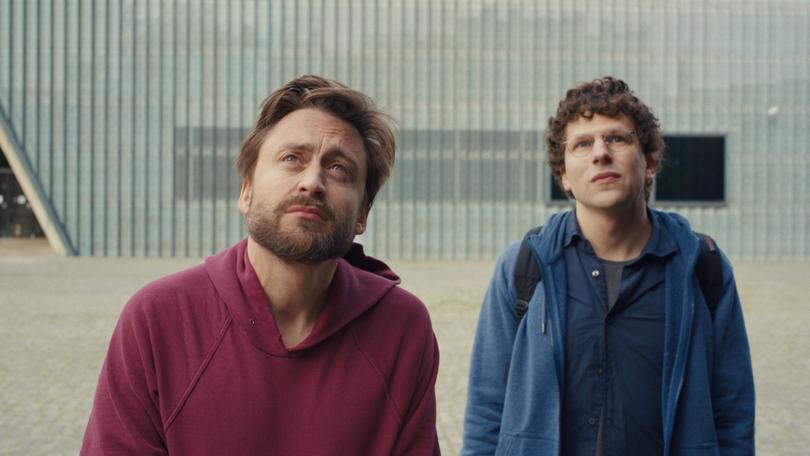
Jesse Eisenberg has just finished filming Now You See Me 3, an upcoming sequel to a franchise he joined more than a decade ago, playing an arrogant magician and master of illusions.
“In the movie, he thinks he’s the greatest in the world, and he’s cocky. It’s the exact opposite to how I personally feel about my own art,” Eisenberg tells The Nightly.
“The weird thing about it was, at the end of every day, I thought ‘Oh, I did great today’, which is something I never feel on a movie set, ever. But because I spent the day in my character’s shoes, who thinks he’s the greatest, it affected my entire personality and self-image.
Sign up to The Nightly's newsletters.
Get the first look at the digital newspaper, curated daily stories and breaking headlines delivered to your inbox.
By continuing you agree to our Terms and Privacy Policy.“I love doing stuff like that, it’s the most cathartic thing in the world.”
Eisenberg is not the easy-going guy, who brashly walks into the room with no qualms about whether he belongs there or not. Eisenberg is the anxious guy, full of nervous, twitchy energy, who’s always in his own head.
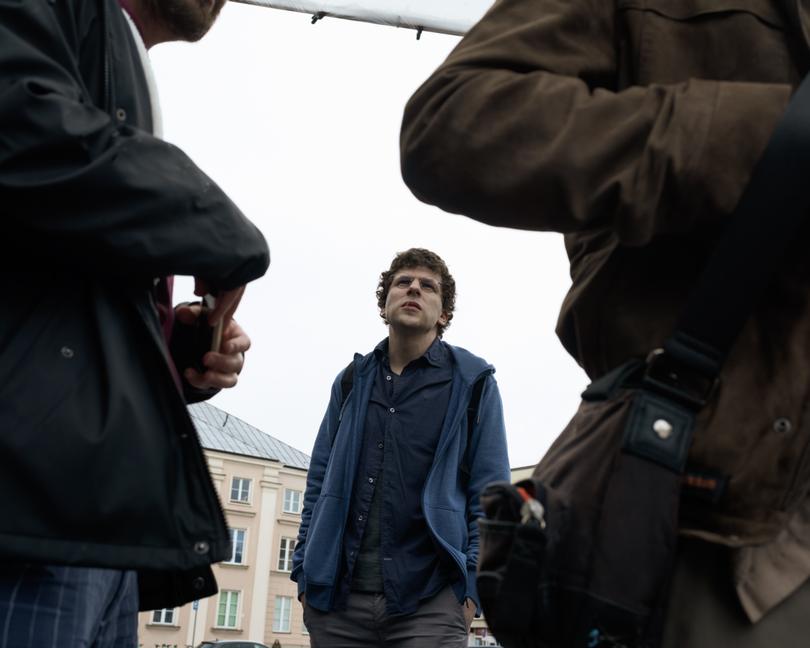
As the writer, director and star of A Real Pain, Eisenberg, who is best known for his role in The Social Network, created two characters, cousins David and Benji Kaplan. David, who Eisenberg plays, is uptight and closed while Benji, portrayed by Kieran Culkin, is a loose unit who feels everything deeply and shares everything with abandon.
While Eisenberg is more like David, it’s Benji he wants to live through vicariously.
“Probably like a lot of people who are writers, I’ve always watched and envied people who are so comfortable in their own skin, even to the point where their misery is comfortable to them,” he says.
“There’s a scene in this movie where Benji is experiencing great grief and misery, and even then, he’s far more open than I am. I’m in awe of people like that. I recognise that’s not me, and I’ve been writing characters like that for a while.
“One of the great catharsis of acting and writing is you can live out these feelings that you stifle in yourself all day.”
David and Benji are on an odyssey of sorts, a Holocaust tour through Poland to honour the history of their Jewish roots and their grandma Dory, who died recently. She had been torn from her home in the small Polish village of Krasnystaw by the Nazis and sent to a concentration camp.
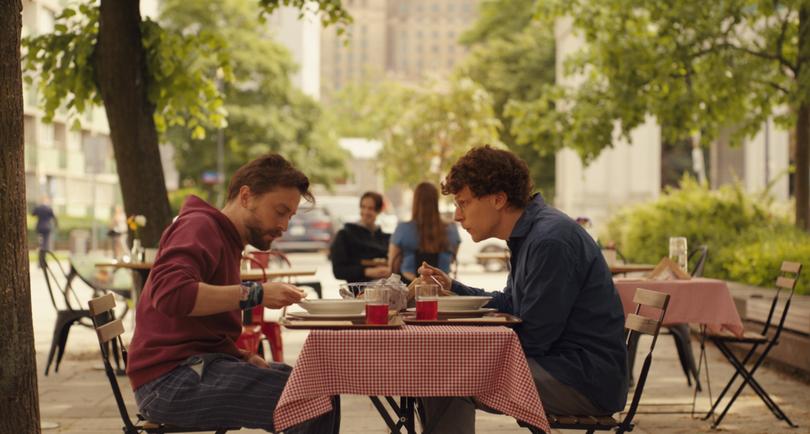
The film explores the thorny dynamic between the odd couple cousins who are almost diametric opposites, especially in how they see and deal with emotions and pain, and their interactions with the people in their tour group.
For a movie dealing with heavy subjects and which features a sequence visiting a concentration camp, A Real Pain is intentionally funny. It uses uncomfortable humour to provoke the audience into feeling something and sitting with it.
The movie oscillates between small moments and big ones, including a couple of pivotal sequences that have put the film, its screenplay as well as Culkin and Eisenberg’s performances in the awards season race.
It’s not always predictable which beats were going to carry the most poignancy, just like in life.
The production filmed at the former real-life house of Eisenberg’s great aunt, the inspiration for the grandma Dory character. When he was younger, he too made a pilgrimage to Krasnystaw and expected to feel something grand and significant, except he didn’t.
Filming there for A Real Pain took him even further away from any connection he was supposed to have. It became just another location where he was stressed out about getting the shots, beating the rain that was expected to come in at 5pm, blocking out the light that was affecting Culkin’s performance.
“I called my dad that night and I said, ‘We were just filming in front of this house’ and he said, ‘How did it feel?’. It felt like being on the set of any movie in the world, it felt like being on the set of a Batman movie.”
It was just a house.
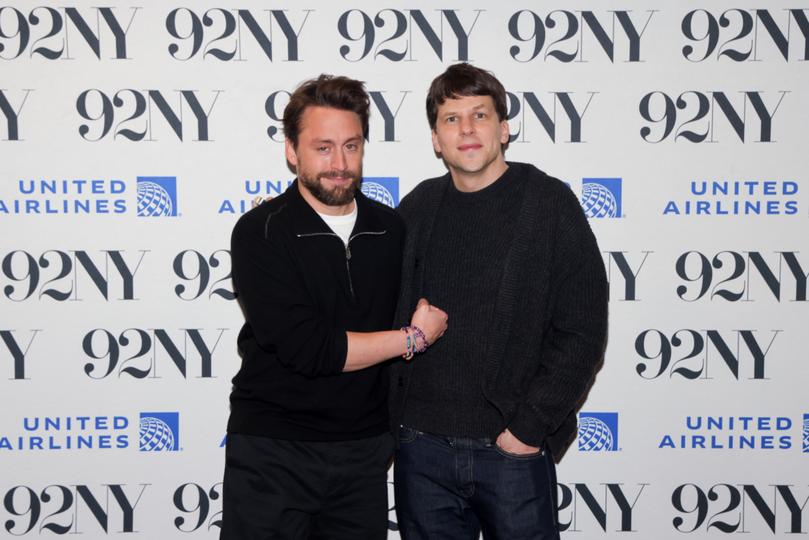
It’s not the building that connects Eisenberg to his family history, to his generational pain. It’s the people. When he first went to Poland, to that house, he was with his wife, whose family also escaped from there.
“We felt a connection to each other, and I felt a connection to the Polish people who were trying to help me make this movie and who understood my family’s history, and lived in the areas that my family lived in 80 years ago. That was the connection I had, and that’s what the movie is about,” Eisenberg explains.
Having toured the film at festivals and around the world since it opened at Sundance in January, Eisenberg has been approached by audience members at the end of screenings with vows that they’re going to make their own journeys to their ancestral homes.
It’s not just Jewish-Americans. People have told him they want to go to Ireland or Haiti, the trip they’ve always wanted to make, and they’re saying to him they plan to go with their sister or brother or cousin. With family.
“That’s the greatest thing in the world because you hope you make a movie that’s so specific it can appeal to the human experience rather than just the experience of these guys going to this village in Poland.”
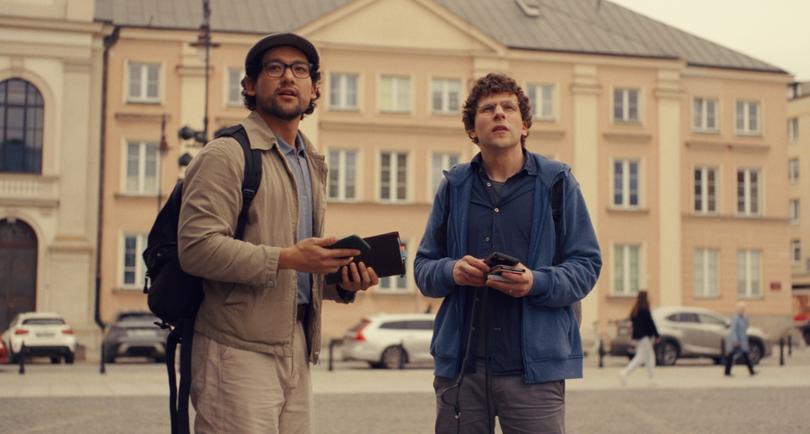
It’s not that Eisenberg believes that we have a duty to understand the pain and trauma of our forebears.
“I’m not an ethicist but I think we have more of a responsibility to connect to people who are going through pain now, and if connecting to the pain of our ancestors allow us to be more empathetic in the present, then that’s really helpful.”
Even though he has made this lauded film about being comfortable with the uncomfortable, it’s not something he has achieved.
“Oh, no, my lot in life is misery,” he says, endearingly, earnestly and without any pretension. “I’m not really wired to be a happy person for reasons that are totally out of my control, or probably totally in my control, but I’m too lazy to fix them. And that’s OK.
“I love my work so much, I got really lucky. Making movies is like winning 10 lotteries a day for a year. I feel really grateful, but I’m miserable around the other edges of the day.
“That’s OK. I love my wife and my child and they’re both happy people. So, I didn’t pass down whatever curse was put on me.”
A Real Pain is in cinemas on Boxing Day

